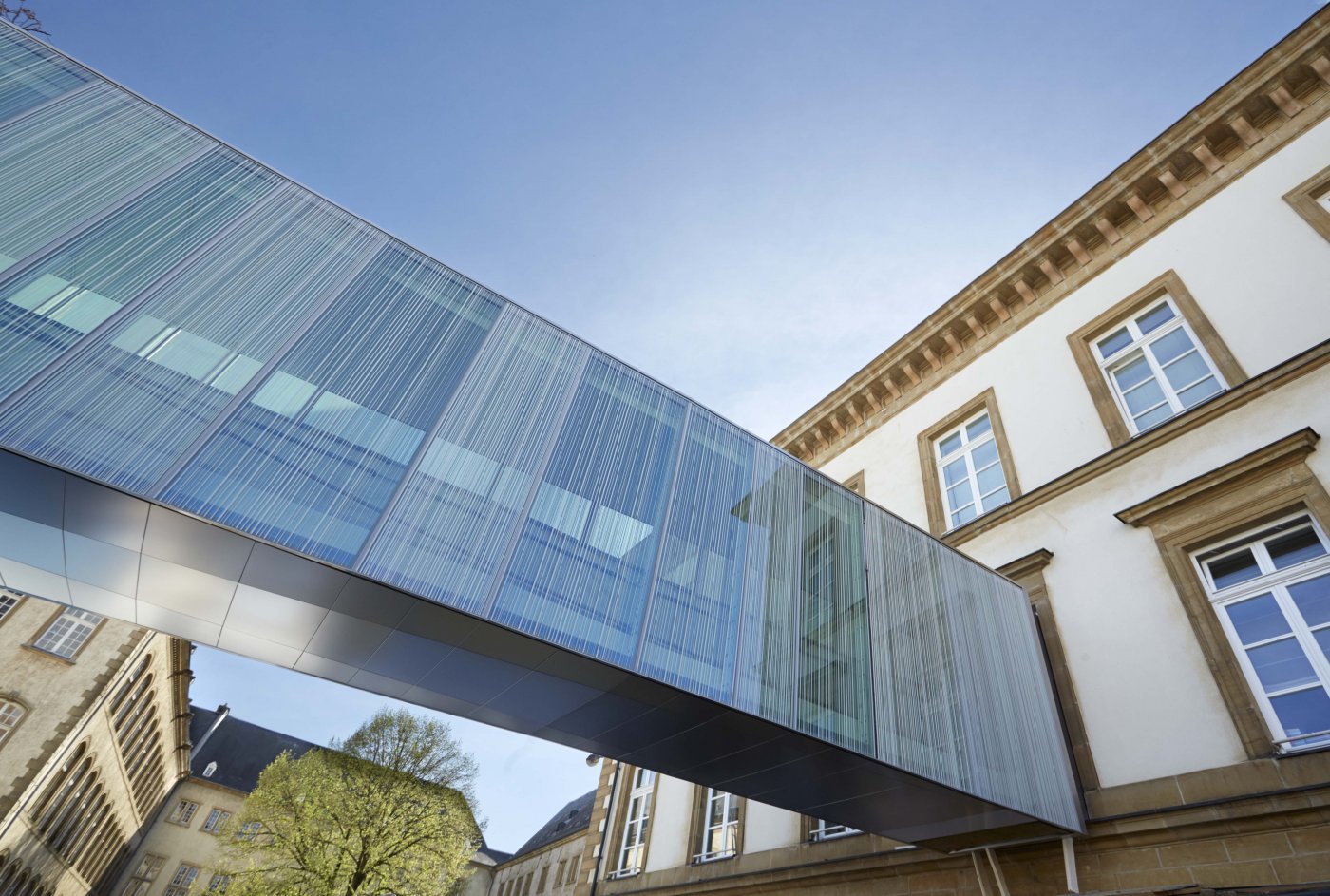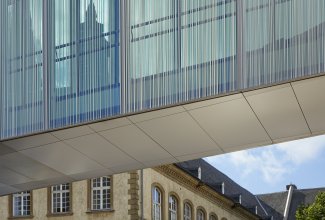Summary record
Video
Impact of Brexit
Question from Claudine Konsbruck
In light of the British Parliament's vote to reject the proposed withdrawal agreement with the EU, it is highly unlikely that an agreement on the United Kingdom's withdrawal will be reached before 29 March 2019. Solutions will need to be found for British citizens residing in Luxembourg, and the Luxembourg Government is currently drawing up several draft bills in preparation for what happens after 29 March.
Since a considerable number of British citizens live and work in the capital, I would like to put the following questions to the college of aldermen:
- How many British citizens are registered with the municipal authorities? Do the municipal authorities know how many British citizens work in the capital?
- The Luxembourg Government is planning to implement a one-year transition period so that British citizens can apply for a new residence permit for third-country nationals.
- Will any changes need to be made to municipal regulations as a result of this new legislation?
- Can we expect to see a flood of applications at the Bierger-Center? If this is the case, does the Bierger-Center need to take on extra staff?
- Given the many queries and concerns of those affected, would it not be useful to set up a special Brexit office where British citizens could seek advice and information on the formalities they will be required to observe?
- Has there been a surge in the number of British nationals applying for Luxembourgish citizenship in the last few months? Can you give us the figures for the number of applications in 2018, 2017 and 2016?
Response by Lydie Polfer
The Mayor and Chair replied that the number of British nationals living in Luxembourg City currently stands at 2,243, but that this data does not tell us where they actually work, though it is reasonable to assume that most work in the City or nearby. Concerning residence permits: if the withdrawal agreement is accepted, the government is willing to consider extending the residence permits of British nationals and their families until 2021, if they wish. If the agreement is rejected, the decision taken by the government in January 2019 means that British nationals living in the Grand Duchy of Luxembourg will have one year to comply with the law, and that if they fail to do so, they will be considered third-country nationals. In both cases, all new arrivals will be considered third-country nationals. Based on the current situation, we do not feel it would be useful to take on more staff at the Bierger-Center since most of the administrative work would be handled by the Ministry of Foreign Affairs' Immigration Directorate (Direction de l'Immigration du Ministère des Affaires Etrangères). The Bierger-Center is currently organised to operate as a "one-stop shop", so to speak, and as such, there is no need to open a special office, or to change current regulations.
Applications for Luxembourgish citizenship by British nationals have risen from 42 in 2016, to 117 in 2017, to 148 in 2018.
Use of religious buildings and their outbuildings
Question from Tom Krieps
The City has gone to great lengths to identify the owners of religious buildings located in the city. Unsurprisingly, all but two of them belong to the City.
Rectories and parish houses were not, strictly speaking, included in the search.
However, this does not mean that they are devoid of interest.
Some rectories, such as the one in Belair, have been empty for quite some time.
Hence my questions:
- What plans does the City have for the empty buildings where parish priests once lived?
- More generally, when does your administration plan to ask the City's parochial authorities on whether they wish to maintain these buildings as religious buildings, in accordance with applicable laws?
Response by Lydie Polfer
The Mayor and Chair replied that the Religious Buildings Management Fund (Fonds de gestion des édifices religieux) had just appointed a clergyman to act as moderator, liaising with the City on matters concerning religious buildings, 21 of which belong to the City and 2 – one on Rue Nicolas Adames and the other on Rue des Maraîchers – to the Religious Buildings Management Fund. For the 21 buildings in question, official agreements would have to be drawn up. The Moderator appointed by the Management Fund is the senior clergyman at the Cathedral, Father Tom Kerger. Moreover, the Management Fund intends to keep all the buildings open.
Talks are currently under way to set the rents for the buildings. The proposed rents are €1,500 a year for the smaller religious buildings, €2,000 a year for the larger religious buildings – such as those in Belair, Limpertsberg, Bonnevoie and the Gare district – and €2,500 a year for the Cathedral. Additionally, agreements will be drawn up – in particular, to regulate what the buildings can be used for and how they are to be maintained.
For the buildings in Pfaffenthal and Rollingergrund, the agreements will also regulate how they are to be used by foreign religious communities. Regarding the use of churches' outbuildings, such as rectories, discussions are also ongoing as to whether they should continue to be occupied by clergymen or used by the church for other purposes.
It was ultimately decided that a rent of €12 per m2 would be charged for the first 80 m2 and a further €4 per m2 for each additional m2. Furthermore, dwellings that will no longer be occupied by clergymen will be used by the City for social housing. Regarding the property on which the Bouillon car park is located, part of the land belongs to the former church-owned factory in Hollerich, while the parish house is owned by the City. As such, discussions are under way to settle the property rights through an exchange or purchase. The college of aldermen will keep the municipal council updated on the outcome of the various negotiations.
Trash at Place Sainte Cunégonde
Question from Tom Krieps
At the end of 2017, your administration had the recycling containers at Place Sainte Cunégonde removed.
What was the reason for that, and does the City not believe that recycling containers are a necessity in Clausen, when in fact, recycling ought to be encouraged?
Response by Patrick Goldschmidt
Alderman Goldschmidt replied that the containers had been removed so that work could be carried out on the site of the former Mansfeld château. The City is fully aware of the importance of having such containers in the area, especially since the nearest containers are located near the youth hostel in Pfaffenthal. An alternative site, at the junction of Montée de Clausen and Allée Pierre de Mansfeld, belongs to the State. The City is currently engaged in discussions with the national authorities with a view to installing a collection point on the site in question for that part of Clausen, and the City will do its utmost to provide residents with a solution as soon as possible.
Gare and Bonnevoie markets
Question by François Benoy
When works commenced on Avenue de la Liberté, the twice-weekly market at Place de Paris (Wednesday and Saturday mornings) was temporarily relocated to the pedestrian section of Rue Sainte Zithe.
According to my sources, the City of Luxembourg informed the traders concerned, at the last minute on Friday, 15 February 2019, that they had to set up their stalls at Place Guillaume II.
As such, I would like to put the following questions to the college of aldermen:
- How long is the relocation of the market from Place de Paris expected to last?
- Can you confirm that the vendors at the Gare market were asked to move to Place Guillaume II? Why? For how long?
- If Rue Sainte Zithe is not available, are there no alternative locations in the district (e.g. Place Walliss, Place de la Gare, Bonnevoie, etc.)?
- The weekly market in Place Léon XIII in Bonnevoie is held on Wednesday mornings. Why is it not held on Saturdays? If it were held on the weekend, it would attract many more people.
Response by Patrick Goldschmidt
The market at Place de Paris was relocated so that works in connection with the tram project could be carried out. The relocation to the pedestrian section of Rue Sainte Zithe was proposed to vendors as it was felt that continuing to have a market in the Gare district would be good for the neighbourhood. However, even though it is located nearby, it seems that the site does not suit the vendors. No agreement could be reached on an alternative site in the Gare district. The City eventually offered to let the vendors use Place Guillaume II, which seems to suit them better.
Regarding the market at Place Léon XIII in Bonnevoie, the vegetable vendors are currently not interested in setting up their booths there on Saturdays, given their weekly schedule. Nevertheless, if the City receives a sufficient number of requests for Saturdays, it would obviously consider organising a market there on Saturdays as well.














